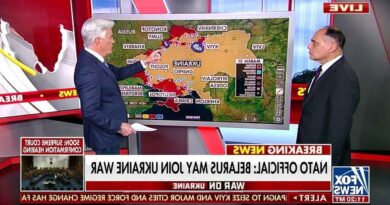People murdered while Government ‘worked from home’ – Afghanistan failures exposed
Dominic Raab grilled on by Dan Walker on his Afghanistan role
We use your sign-up to provide content in ways you’ve consented to and to improve our understanding of you. This may include adverts from us and 3rd parties based on our understanding. You can unsubscribe at any time. More info
After the Taliban seized control of Kabul, a monumental rescue effort was launched in order to extract Afghans and British nationals from the region. Thousands of desperate people appealed to the UK to be rescued in the extraction efforts that lasted a fortnight.
However, a junior civil servant has criticised the Government’s role in the rescue response, claiming that the effort was impacted by the “work from home” culture.
In written evidence to the Foreign Affairs Committee, Raphael Marshall, who worked as a Desk Officer handling requests from Afghans seeking flights out of Kabul in August, has outlined what he considers to be failures in the Afghanistan Crisis Response.
In his written report, he claims between 75,000 and 150,000 Afghans who were at risk because of their links to Britain applied to be evacuated.
He estimated though that fewer than five percent received any assistance and within his 39-page dossier, Mr Marshall added: “It is clear that some of those left behind have since been murdered by the Taliban”.


He added that staff at the crisis centre would not normally be expected to work at weekends or overnight.
He claims this refusal of overtime was part of a “deliberate drive” to prioritise “work-life balance” while working from home.
The former civil servant also claims that thousands of pleas sent via email – including ones with subject lines such as “please save my children” were opened, but not dealt with.
The 25-year-old said that officials struggled to process the volume of emails and failed to prioritise cases.
He also claims that the purpose of emails being left unanswered “was to allow the Prime Minister and the then Foreign Secretary to inform MPs that there were no unread emails.”
He added: “It is difficult to see what other purpose this method served because these emails will need to be reread and prioritised before any action can be taken.”
He also claimed that no one on the rescue effort team spoke any Afghan languages, meaning that calls to people asking for help had to be conducted in English.
According to his dossier, junior staff members were “scared by being asked to make hundreds of life and death decisions about which they knew nothing”.
He also claims, that for one afternoon during the two-week evacuation effort he was the only person “monitoring and processing emails in the Afghan special cases inbox”.
In his statement, he added: “In my opinion, staffing shortages were exacerbated by some staff working from home, which hampered communication.”
Mr Marshall resigned from his position at the Foreign, Commonwealth and Development Office (FCDO) in September.
DON’T MISS
Taliban warned by USA and UK over ‘summary killings’ [INSIGHT]
Donald Trump blasts US top general as ‘a f***ing idiot’ [REVEAL]
Raab accused of putting ‘bureaucracy over humanity’ in evacuation [ANALYSIS]
The two-week rescue effort was described by Mr Raab as “the biggest operation in living memory” of its kind.
Following the Taliban takeover, the UK airlifted 15,000 people out of the country.
These included 5,000 British nationals, 8,000 Afghans and 2,000 children.
Mr Marshall has claimed that former foreign secretary Dominic Raab was too slow to make decisions and that he “did not fully understand the situation”.
Mr Raab hit back at the criticism of his decision making in an interview, saying it came from a “relatively junior desk officer”.

He told BBC Breakfast: “I don’t doubt there were challenges, I don’t doubt there will be lessons to be learned but if you look at the facts, I think we did a good job by recent standards of evacuations and by international comparisons.”
A UK Government spokesperson told Express.co.uk: “UK Government staff worked tirelessly to evacuate more than 15,000 people from Afghanistan within a fortnight. This was the biggest mission of its kind in generations and the second-largest evacuation carried out by any country. We are still working to help others leave.
“More than 1000 FCDO staff worked to help British nationals and eligible Afghans leave during Op Pitting. The scale of the evacuation and the challenging circumstances meant decisions on prioritisation had to be made quickly to ensure we could help as many people as possible.
“Regrettably we were not able to evacuate all those we wanted to, but our commitment to them is enduring, and since the end of the operation we have helped more than 3000 individuals leave Afghanistan.”
Source: Read Full Article

